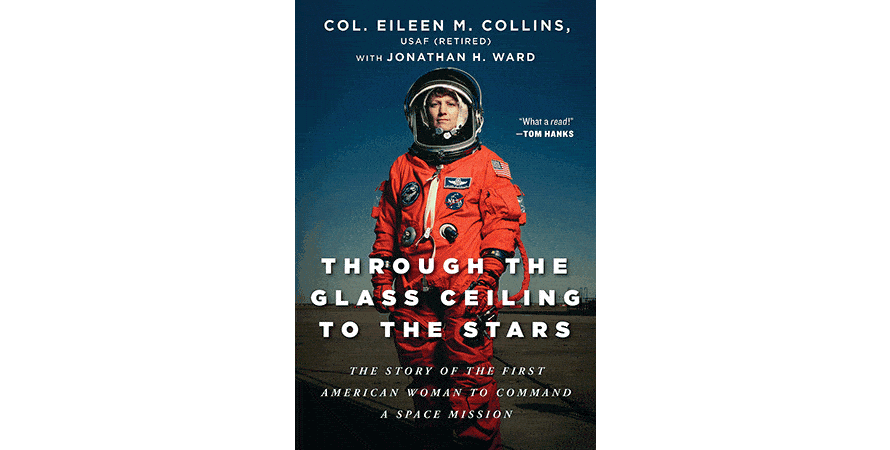Category: Nonfiction
Reviewed by: Clifford R. McMurray
Title: Through the Glass Ceiling to the Stars: The Story of the First American Woman to Command a Space Mission
Author: Col. Eileen M. Collins USAF (Retired) with Jonathan H. Ward
NSS Amazon link for this book
Format: Hardcover, Kindle, Audiobook
Pages: 296
Publisher: The MIT Press
Date: October 2021
Retail Price: $27.99/$18.99/$18.37
ISBN: 978-1950994052
Two days before her first spaceflight in 1995, at the traditional prelaunch party, Eileen Collins met Valentina Tereshkova. The contrast between the two women, even discounting the difference in their ages, couldn’t have been greater. Thirty years earlier Tereshkova had become the first woman space traveler, but she’d done so as a mere passenger in an automated capsule; she wasn’t even an airplane pilot. Collins was a veteran Air Force test pilot, with twenty years and thousands of flight hours in experience, and she’d be flying to space as the first female pilot of a spaceship. In the years ahead she would fly to space four times, and each of those four flights would be a historic mission. Her first flight was also the first Space Shuttle rendezvous with the Russian Mir space station, paving the way for a series of long-duration missions to Mir by American astronauts. Her next flight was also to Mir. On Collins’ third flight, delivery of the Chandra X-Ray Telescope to orbit, she moved to the left seat of the Shuttle as the first female spacecraft commander. And her last flight was the “Return to Flight” mission, the first Shuttle flight after the Columbia accident.
These flights would make for quite a story all by themselves, but Collins had been making history before she ever got to NASA. She was one of the Air Force’s first female pilots, the first female to pilot the F-15 fighter plane, and the first female pilot to complete test pilot training at the Air Force Test Pilot School at Edwards Air Force Base, home of legendary test pilots like Chuck Yeager and Neil Armstrong.
There was little in Collins’ childhood to encourage her or anyone else to assume she was destined to make any big mark in the world. Her father was an alcoholic who eventually moved out, leaving her mother to raise her and her brother and sister alone. They lived a lower-middle-class existence that included some time on welfare and food stamps. The strain led her mother to attempt suicide, and while she was in hospital from that episode, the teenaged Collins took care of her younger siblings at home by herself. She was a shy, unexceptional student, and a stutterer. But she was interested in flying from a young age, and she was determined. She joined Air Force ROTC, and started making history.
There’s something in this book for everyone. For young people of both sexes, there’s an inspiring story of how focusing on your goals can take you farther than you imagined at the beginning of your journey. Collins also wants her book to inspire young people to consider military careers, and whatever career they choose, to be grateful for the country that gives them the freedom to pursue their goals. And of course, there are the stories of the spaceflights themselves. Even jaded space buffs will get their adrenaline fix while reading her account of the STS-93 launch, where one of the Shuttle’s main engines nearly exploded due to a hydrogen leak.
Women will, I think, be especially interested in Collins’ efforts to balance the family life she wanted with the career she wanted. She obviously couldn’t fly on the Shuttle if she were pregnant, so when her first flight was delayed for a year, she had to postpone her plans to have her first child. Her military career and NASA training had already pushed those plans to later in her life than the prime childbearing years. She would in time have two children. Shuttle checklists were some of their early bedtime reading. After Columbia was lost, Collins had to train for return to flight while dealing with the emotional trauma of a seven year old daughter who was just old enough to understand that her mother was going to be riding a spacecraft that had killed the last crew who tried.
Throughout her adult life, Collins has set goals for herself and focused on accomplishing them. As with her flying aircraft and spacecraft, so with this book: all the goals she set for herself in writing the book—inspiration and historical narrative—have been admirably fulfilled. This is one of the essential astronaut autobiographies.
© 2022 Clifford R. McMurray
Please use the NSS Amazon Link for all your book and other purchases. It helps NSS and does not cost you a cent! Bookmark this link for ALL your Amazon shopping!



















